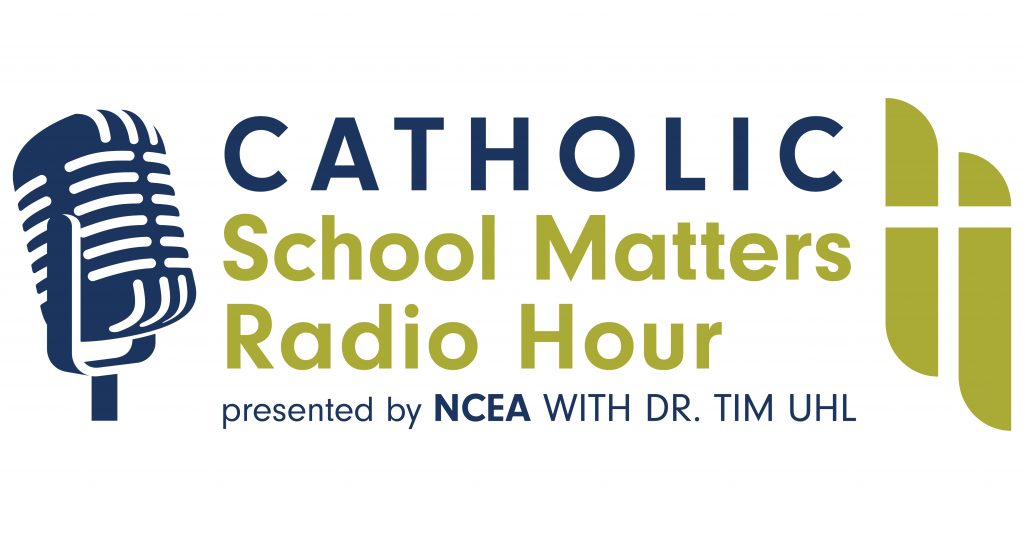
This week’s Catholic School Matters podcast welcomes two great guests. First, Maureen Dowling, who has served for nearly 20 years in the U.S. Department of Education Office of Non-Public Education (ONPE), joins the podcast to discuss her interaction with Catholic schools. Her office is housed in the Secretary’s office and the purpose of the office is to try to promote maximum participation in U.S. Department of Education efforts.
With a background in Catholic schools, Dowling speaks to the importance of unique missions and the contributions of non-public schools. She speaks to two major programs: Title I, which can provide supplemental educational services to students who need additional support; and Title IIa, which provides professional development for teachers. She clarifies the history of these programs and clarifies how the local administration of federal funds can lead to confusion.
The funds flow from the Department of Education to LEAs and cannot flow directly to private schools. The LEA is the fiduciary agent and there is confusion around the process. It takes time to understand the process.
Dowling also discusses programs such as IDEA, Blue Ribbon Schools and Green Ribbon Schools. She offers help to schools and support for the programs. But she also clarified what she can’t do—controlling curriculum, accrediting schools, or passing regulations for private or home schools. Those types of regulations occur on the state or local level.
We discuss the confusion over the Common Core standards and how some people perceive that the federal government is pushing the standards. She discusses how she interacts and responds to inquiries and supports non-public schools and then she explains the Education Freedom Scholarships and the new frontiers of school choice.
Dr. Kevin Baxter, now the Chief Innovation Officer at NCEA, joins the podcast to discuss his efforts to push innovation out from NCEA. He wants to set up a mechanism to think through the big challenges and try to scale out innovations.
We started by discussing why the superintendent role (which he filled for 10 years) is so demanding. In the midst of the day to day, Baxter says it was difficult to measure progress. He also pointed out the intensity of the position was draining, although it started out as wonderful. Working for the Church is demanding because it is “our” Church where we celebrate our faith but now we are part of the institution, too.
Baxter also spoke about the challenges of responding to the controversies and crises inherent in the nation’s largest Catholic school system. The frequency and the fact that his phone could always ring never allowed him to take time away from his phone. We talk about how as superintendent you can prioritize your time and focus on your priorities.
Baxter then discussed new initiatives:
- Micro-schools. He wants to develop a model for small schools (enrollment of 150 students or less). The initial focus is on the 1500 elementary schools across the country which have 150 students or less. How can we support them with best practices? Baxter assumes that most of the schools don’t have a plan for their enrollment because they aren’t small on purpose. He has surveyed schools, set up a Professional Learning Network with the goal to set up strong Catholic identity, strong academic outcomes, and financial sustainability. They are focused on technology, teacher training, principal training, and assessment tools.
- Leadership Succession. Many schools and dioceses are creating programs for future leaders. We discuss why many schools do not hire internal candidates, the challenges to developing a bench of available candidates, and the role that governance plays in these decisions.
- Finance. How do we get to a funding mechanism that isn’t relying on tuition or philanthropy? Baxter wonders if we can use surplus property to provide stable funding. He points out that real estate is what many dioceses possess. The Archdiocese of New York is the largest landowner on the island of Manhattan, for example. He is trying to prompt schools to be creative.
- Recognizing that the parish-based model is facing challenges in many areas. How can we help develop and train leaders on new models? He mentions the new FADICA report coming out in January that will measure the prevalence of new leadership models which should lead to research on effectiveness.
- Professional Learning Networks (PLNs). Baxter is trying to build new PLNs. Every Catholic educator feels alone at some point. He is trying to build new structures and scale them out to support best practices and build community.
Baxter is a busy, busy leader! It’s a great conversation about innovation and change in our Catholic schools. He welcomes input and collaborators and can be reached at [email protected]. Look for NCEA surveys in your inbox from Dr. Baxter.